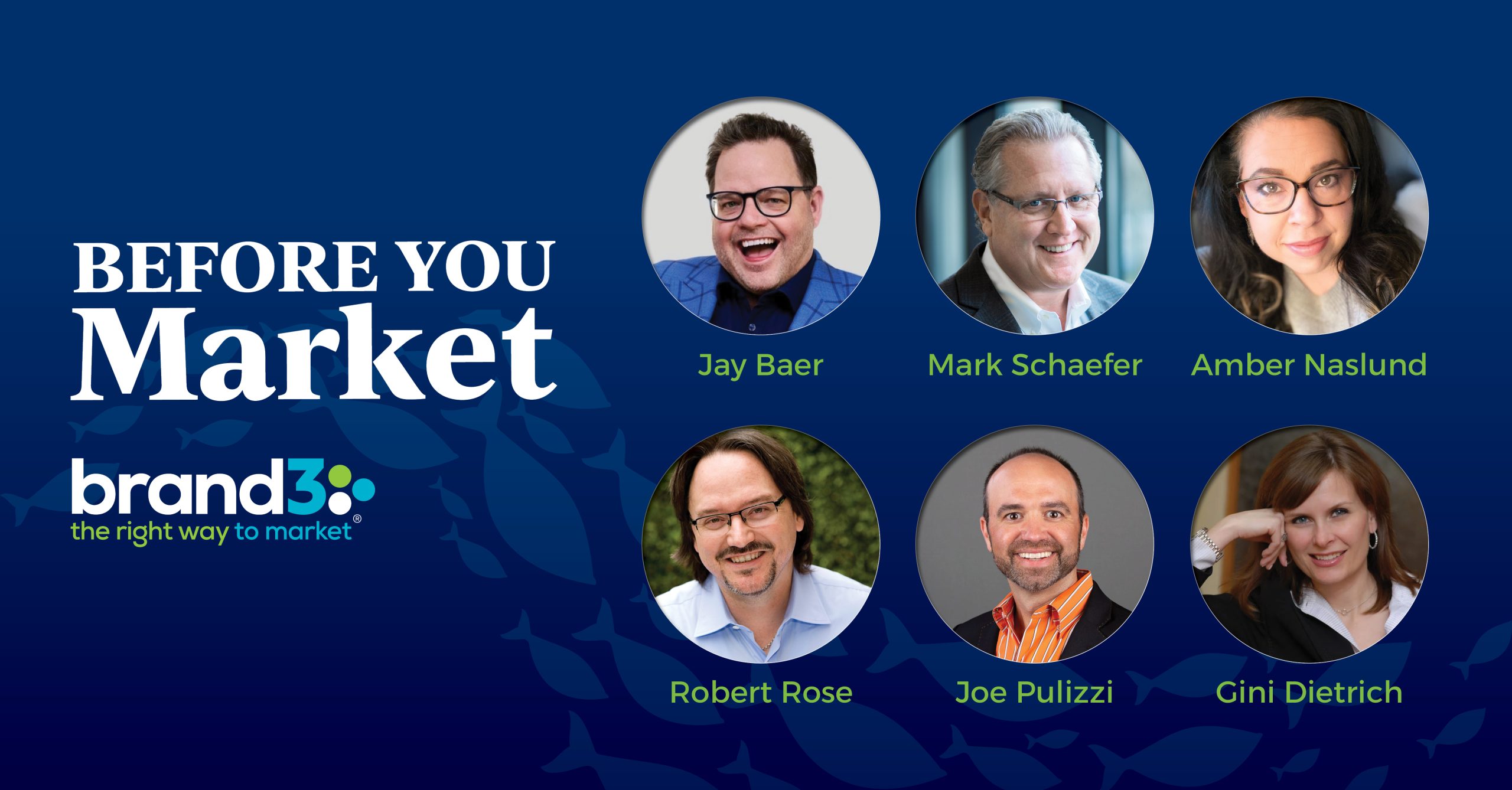

Why are industry-leading marketing experts urging brands and marketers to embrace their humanity in an AI age?
I’ve been in the marketing industry for over 25 years. During that time, I have spoken at conferences and interviewed several marketing experts. Certain themes emerged along the way that remain today.
Brands need to build trust and authority, consistently demonstrate their expertise and value, and offer insight and guidance that is uniquely theirs. These efforts will be rewarded over time through audience engagement, growth, and attention.
My expert friends here agree.
I've known these marketing thought leaders for some time now. They are a crew of business leaders, authors, and keynote speakers who spend an inordinate amount of time researching, writing, and speaking about marketing trends, strategies, and its future.
They always provide helpful and sometimes challenging advice. Their insights have been valuable, empowering, and, in some cases, even visionary.
Over the past few months, I have had the privilege of speaking to these experts on our Before You Market podcast and asking for their advice on marketing strategies, content creation, and what role AI should play.
Here are the players in our little group of merry content whisperers:
Gini Dietrich is the founder and CEO of Arment Dietrich, an integrated marketing communications firm. She is also the creator of Spin Sucks, a top blog for PR and marketing professionals. Gini is also a prominent speaker, author, and thought leader in communications and PR, focusing on ethical marketing and transparent business practices.
Amber Naslund is a seasoned marketing and social media strategist. She currently serves as the Senior Content Consultant at LinkedIn. Amber and another of our experts, Jay Baer, co-wrote The Now Revolution, a book that explores how businesses can adapt to real-time social media engagement.
Joe Pulizzi is considered a pioneer in the content marketing industry, founding the Content Marketing Institute, which runs Content Marketing World, the largest content marketing event globally. He is a prolific author of several books, including Epic Content Marketing and Killing Marketing. Joe’s recent venture, Tilt Publishing, helps content creators and marketers launch and sell their books directly.
Mark Schaefer is a globally recognized marketing strategist and business consultant. He’s written several bestselling books, including Marketing Rebellion, The Content Code, and KNOWN. Mark’s company, Businesses Grow, provides consulting services to some of the world’s largest brands, helping them navigate digital transformation and content strategy.
Robert Rose is the Chief Strategy Officer of The Content Advisory, a content marketing and strategy consultancy. He co-hosts the popular This Old Marketing podcast with Joe Pulizzi. Robert is also the author of Killing Marketing and Experiences: The 7th Era of Marketing and a sought-after keynote speaker on marketing, content strategy, and customer experience.
Jay Baer is a marketing and customer experience expert, founder of the digital marketing consultancy Convince & Convert, and a New York Times bestselling author. His books include Youtility and Hug Your Haters. Jay is also a frequent keynote speaker and hosts the Social Pros podcast. He is known for his focus on customer-centric marketing and content strategies that emphasize empathy and engagement.
As I spoke to each of these people over the last few months, I noticed a common theme emerge… don’t make bad content. What do I mean by that?
Read on, and you will see.
We can all get lost in tools and tactics and forget that marketing is still a conversation between two humans. People must trust that the information they receive is legitimate, real, and from experts.
Our content guides share their insights:
Gini Dietrich on the use of AI in content creation:
"If you are creating content that demonstrates your expertise and your experience, that automatically, no matter if it's Google or Yahoo or Bing or AI, is going to help you create authority and trust... If you can't take what AI has output and include your experience and expertise, you're going to sound like everybody else, and it's not going to be valuable."
Amber Naslund on thought leadership and expertise:
"There’s still a lot of appetite for expertise, knowledge sharing, like in-depth thinking... I think people are just hungry for substance."
Joe Pulizzi explains why you need to focus on value and audience:
“How do I become the leading expert in this thing? So I can help my audience get a better job, live a better life, do something, and if I can do that, they’ll probably buy some stuff from us.”
“If you’re delivering consistently helpful information to my target audience... I want to think more thoughtfully about my marketing.”
Mark Schaefer on the role of authenticity:
"I do think that we will always have a need for human connection, for real human emotion. We are going to want to know, who are these people at these companies? What do they believe in?"
Robert Rose on building trust through content:
"The real focus for any new brand or any new product... is to build that differentiated value from step one... You have to start building a foundation from the very, very beginning."
In today’s AI-obsessed world, it’s important to find a balance and ensure that you lead with your humanity—not just in the sense of being real but also in the sense of providing real insight, real experience, and your legitimate expertise.
Now is your chance to cut through the noise with original thought that helps your target audience solve the problems they’ve come to you with. Yes, AI can help you organize, research, and edit. But the expertise should come from you.
I learned long ago that trying to game the algorithm is a fool’s errand. You will always do better to aim on the side of quality.
The experts agree:
Joe Pulizzi on creating the content proposal want and being thoughtful about your content:
"I'm not turned on by marketing that is just wanting to sell stuff all the time... Usually, the company with the biggest budget wins in that scenario. But I want to think more thoughtfully about my marketing."
“Can somebody actually want to receive my marketing? Wow. Think about that, that that’s exciting to me.”
Mark Schaefer on writing for humans over algorithms:
"Everything about the social web really diminishes humanity. If you want to play the game and do it right, you’re writing for algorithms, basically not people. You’re featuring keywords, not voices and emotion."
"I think that’s the main reason why we’ve sort of lost our humanity in marketing."
Robert Rose on the importance of brand storytelling over SEO tactics:
"It's no longer good enough to just be provocative or do weird things or do stunts that don’t build value... you have to start building a foundation from the very, very beginning."
Businesses should do marketing that their audience thanks them for. Focus on providing value above all else. Yes, optimize your content, include tags, and do keyword research. Have those things available to you as you write…
But write for people and create content that they will thank you for.
Yes, you can achieve short-term gains with tricks and controversy, but what lasts is creating quality content that your audience trusts and even relies upon.
More from our guides:
Jay Baer on quality and content that stands the test of time:
"It’s funny, as is true with a lot of my work. It’s more accurate and valid and vital today than it was when we wrote it."
Joe Pulizzi on the power of consistency:
“Content marketing is a labor of love for yourself and for your customer. You’ve got to really want it; it’s a marathon, not a sprint.”
This is where a consistent brand voice will pay off handsomely in the long run. Content marketing is a long game. It takes time to build loyalty and trust.
Consistency is critical for building a level of comfort and familiarity with your audience. As you work at it, you will get better, gain more attention, and cultivate a following that helps you show up in the SERPs and on social media.
Humans buy from humans. Maybe that will not be the norm in some scary future, but for today, it’s still how things work.
Write for humans, say our experts:
Amber Naslund:
"Buying is still an emotional process... It’s not all rigidly rational."
Mark Schaefer:
"My mission is to inject more audacity, more authenticity, more human voices and emotion into our marketing."
Robert Rose on the value of unique storytelling and diverse perspectives:
"It is about bringing forward the different points of view... They’re all telling the same or similar story, but they’re doing so through their voice, through their lens."
The commonality here is to focus on writing for people, stop trying to game the system, and do the hard work. Quality content comes from us, from our imagination, our passions, and our years of experience.
Yes, AI can still be a viable tool. Use it to outline and grab snippets of interviews for a round-up post, like I did here. But you still need to do the work. You still need to worry about your brand, your voice, if you’re being helpful, and…
And this is very important…
Are you creating useful content or just adding to the noise?
Subscribe to our YouTube channel for early access to new Before You Market podcast episodes!






MAILING LOCATIONS
1200 Agora Drive
Suite C #307
Bel Air, MD 21014
OFFICE LOCATIONS
Havre de Grace, MD
Seattle, WA

